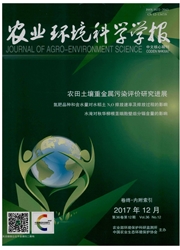

 中文摘要:
中文摘要:
针对集约化养殖中大量使用含Zn饲料添加剂及其在畜禽粪便中的残留问题,采集北京6个郊区县集约化养殖场208个猪、奶牛、鸡饲料样品和204个粪便样品,分析测定了其中Zn含量。结果表明,北京地区集约化养殖饲料和粪便中Zn含量差异很大,猪饲料和猪粪中Zn含量远高于奶牛和鸡。猪、奶牛、鸡饲料中Zn的含量范围分别为72.77~3170.37mg·kg^-1、13.63—471.39mg·kg^-1、32.64—344.67mg·kg^-1,平均含量分别为347.57、86.44、138.76mg·kg^-1;猪、奶牛、鸡粪便Zn的平均含量分别为2333.97、119.41、391.01mg·kg^-1,含量范围分别在458.21—14031.79、10.36~502.39、73.15~678.91mg·kg^-1之间。猪饲料和猪粪Zn超标率分别为9.3%和15.0%,奶牛、鸡的饲料和粪便均未超标。畜禽粪便中Zn含量与其饲料中zn含量之间呈显著或极显著正相关(P〈0.05),猪、奶牛、鸡粪便中Zn的平均含量分别是其饲料的6.7倍、1.4倍、2.8倍,表现出一定的“浓缩”效应,其中断奶仔猪饲料和粪便中zn的平均含量最高,分别为645.37和5133.64mg·kg^-1,“浓缩系数”高达6.61。高Zn含量的畜禽粪便在土地利用时可能会带来土壤污染风险。
 英文摘要:
英文摘要:
208 pig, dairy cow, chicken feeds and 204 fecal samples from intensive livestock and poultry farms were collected in 6 districts and counties of Beijing. The concentrations of Zn were analyzed. The results showed that Zn contents varied greatly among feeds and feces in this study, The concentrations of Zn were in the range of 72.77~3 170.37 mg·kg^-1, 13.63-471.39mg·kg^-1and 32.64-344.67 mg·kg^-1 respectively in pig, dairy cow and chicken feeds, and the mean values were 347.57 mg·kg^-1, 86.44 mg·kg^-1, 138.76 mg·kg^-1, respectively. The concentrations of Zn ranged from 458.21 to 14 031.79 mg·kg^-1, 10.36 to 502.39 mg·kg^-1, 73.15 to 678.91 mg·kg^-1 respectively in pig, dairy cow and chicken feces, and the mean values were 2 333.97 mg·kg^-1, 119.41 mg·kg^-1 and 391.01 mg·kg^-1, respectively. It is clearly that the concentrations of Zn in pig feeds and feces were much higher than that in dairy cow and chicken feces. The over standard rate of Zn concentrations in pig feeds and feces were 9.3%, 15.0%, respectively, no samples of dairy cow and chicken contained Zn beyond the ceiling limitation. The contents of Zn in livestock and poultry feces showed a significantly positive correlation with that in their feeds at the 0.05 level Zn concentrations in pig, dairy cow and chicken feces were 6.7,1.4,2.8 times greater than in their feeds, displayed an obvious "concentrated effect". The mean contents of Zn in weaner feeds and feces were 645.37 mg·kg^-1 and 5 133.64 mg·kg^-1, respectively, were the highest in the study, with "concentrated coefficient" of 6.61. Hence, the utilization of animal feces with high Zn content might cause the potential risk on farmland and the plants.
 同期刊论文项目
同期刊论文项目
 同项目期刊论文
同项目期刊论文
 期刊信息
期刊信息
